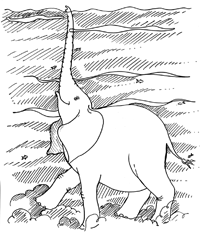STRANGE BUT TRUE- Displacement: Elephants are great swimmers

DRAWING BY DEBORAH DERR McCLINTOCK
Q. When elephants need to cross a river and can't find a bridge, what's their recourse? –T.R. Zan
A. Excellent swimmers, they can go for hours, says Guy Murchie in The Seven Mysteries of Life. Faced with a strong current, elephants have been known to erect their trunk as a snorkel, then march right across rivers 12 feet deep, treading bottom.
They snorkel too while swimming, mammoth animals lightened greatly by body buoyancy, leading to speculations long ago that ancestral elephants may have come out of the seas. New evidence for this, from the University of Melbourne, traces early embryological features of the elephant– respiratory, reproductive, etc.– to creatures well adapted to life in an aquatic environment.
Then the time came– who knows why– when they packed up their trunks and hit the beachhead.
Q. Just what may come of a sneezing elephant's "jumbochoo"? a) a face-drenching shower of pachyderm mucus b) a big wind like a hurricane forced through a flailing fire hose c) kids thrown out of the zoo d) an elephantine crop-raid deterred? –P.T. Barnum
A. Under the right circumstances, any of the above, as noted in New Scientist magazine. One Botswana writer told of frequently enjoying the African nights by sleeping under mosquito netting rather than a tent. "You can wind up being investigated by lions, hyenas, hippos and elephants, which can be quite exciting," he says. Then one time a friend of his awoke and, unable to see the stars, assumed it had clouded over. Suddenly he realized he was looking up at an elephant's underside, with the animal sniffing him through the net. Without warning the trunk spewed out a faceful of mucus, much as a dog, cat, or human might do to remove foreign or excess material from the nasal passages.
The "big wind" came at a zoo where kids had fed an elephant handfuls of pepper. It snorted and wheezed a few times before unloosing a sneeze "hurricane" that got the kids kicked out. Finally, farmers concerned about pachyderm crop damage will at times use chillies to induce sneezing. They plant chilli seeds around the fields and burn dung cakes laced with chilli at night, supported in part by the Elephant Pepper Development Trust.
Q. If you're a chocolate lover, you should thank (blame?) a) your parents b) your "sweet tooth" c) the candy industry's advertisers d) the microorganisms in your gut. –A.M. Taylor
A. All of these to a degree, but the new biologically based choice is d), those amazing, "trainable" bacteria in your belly, says Science magazine. People keen for the candy, say researchers, harbor different types of bacteria from other folks. When biochemists analyzed metabolic byproducts in urine and blood samples of chocoholics, a fascinating anomaly emerged: The gut differences are not just a product of our genes, since volunteers who had moved to the United States from India showed the same changes in their gut bacteria over time. Also, their blood had lower levels of bad cholesterol and higher levels of albumin, a nutrient-carrying protein. Said one United Kingdom microbiologist, "Understanding how diet affects gut activity can lead to personalized nutrition plans for nudging bacteria in the direction of good health."
Q. It's called "the Fermi paradox," and the deeper humankind looks into it, the more profound its implications become. As Arthur C. Clarke once pointed out, the question must have an answer, one way or other, and either way, it will be equally amazing. In fact, if we ever learn the answer, it will cause the most dramatic shift in the status of our human species that has ever occurred in history. What is this famous question? –A. C. Clarke
A. Nobel-prize winning physicist Enrico Fermi posed this during a 1950 discussion with other scientists about extraterrestrial intelligence: If alien civilizations really are as common as it seems they ought to be, "Where is everybody?" Partly the answer to this means thinking about what a grown-up civilization might do, says Jeffrey Bennett in Beyond UFOS. Though we've never yet met one, Bennett explains, I have a pretty good idea what we humans must do to become one: We must grow and grow in wisdom because only if we learn to find solutions to worldly problems such as global warming, poverty, disease, terrorism and war– and only if we do all of this together– can we stay around long enough to gain the necessary knowledge and technology to reach outward to embrace "what lies beyond." If we can do this, "the possibilities that await us are infinite."
Send Strange questions to brothers Bill and Rich at [email protected]